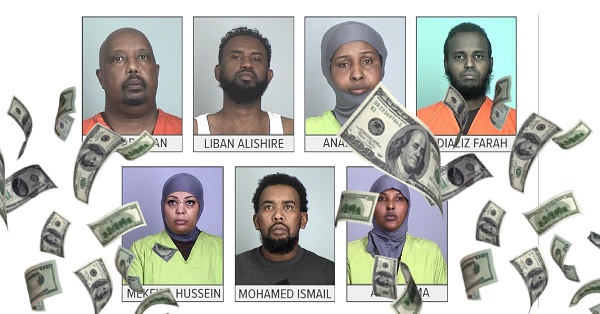Business
Global Affairs Canada goes on real estate spending spree, taxpayers foot the bill

From the Canadian Taxpayers Federation
By Ryan Thorpe
Records obtained by the CTF show Clark’s lavish condo is just the tip of the iceberg, with the department dropping taxpayer cash on other luxury properties around the world.
Official residences in other countries: $38 million.
Properties in Afghanistan abandoned to the Taliban: $41 million.
Vacant land in Senegal: $12.5 million.
A chancery in Ukraine: $10.2 million.
Those are some of the holdings in Global Affairs Canada’s real estate portfolio, which has cost taxpayers $186 million in the past 10 years alone.

All told, Global Affairs Canada owns more than 400 properties in more than 70 countries, according to access-to-information records obtained by the Canadian Taxpayers Federation.
“Do we really need the government dropping tens of millions of dollars on official residences half-way around the world?” said Franco Terrazzano, CTF Federal Director. “Better question, does Senegal not have vacant land available for less than eight figures?
“With the government more than $1 trillion in debt, taxpayers need to know why the government is spending so much of our money overseas.”
Global Affairs Canada is embroiled in controversy after it purchased a $9-million luxury condo for New York Consul General Tom Clark amid a housing and cost-of-living crisis.
The records obtained by the CTF show Clark’s lavish condo is just the tip of the iceberg, with the department dropping taxpayer cash on other luxury properties around the world.
Global Affairs Canada has spent $38.4 million on official residences since 2014, including New Zealand ($2.4 million), Barbados ($3.8 million) and Trinidad and Tobago ($2.5 million), among others.
In London, U.K., Global Affairs Canada spent $58 million on 23 properties since 2015, all of which serve as “staff quarters,” according to the records. All told, Global Affairs Canada owns 65 properties in London purchased for $208 million.
In Kabul, Afghanistan, Global Affairs Canada spent $41 million on three properties in late 2018 and 2019, which have since been abandoned to the Taliban.
Prior to the first property in Kabul being purchased, the U.S. had already begun negotiations with the Taliban for an end to the Afghanistan War.
Seven months after Global Affairs Canada purchased the last property in Kabul, the U.S. struck a deal with the Taliban for the withdrawal of American troops from the country.
On Aug. 15, 2021, Canada pulled its presence from Afghanistan.
“We have … been unable to inspect the state of these properties since that date,” Global Affairs Canada told the CTF in a written statement.
In October 2021, the Globe and Mail reported that “Islamist militants now guard the former headquarters of Canada’s diplomatic mission in the Afghan capital.”
“This is a lot of taxpayers’ money to spend on new property in Afghanistan when our ally had already been clear it was preparing to leave,” Terrazzano said. “Canadian taxpayers are out $41 million and the Taliban now has new digs, so is anyone in government going to answer for the decision to purchase these properties?”
In Kyiv, Ukraine, Global Affairs Canada purchased a chancery for $10.2 million in 2017.
In Senegal, a country in West Africa, Global Affairs Canada bought $12.5 million worth of “vacant land” in 2022.
“Global Affairs Canada’s real estate portfolio is bloated and the taxpayer tab is ludicrous,” Terrazzano said. “Someone in government must explain what value taxpayers are supposedly getting for the hundreds of millions of dollars spent on all these lavish properties in far flung countries.
“And if Canadians aren’t getting real value, then it’s time to sell off properties so taxpayers can recoup some of this money.”
Business
Largest fraud in US history? Independent Journalist visits numerous daycare centres with no children, revealing massive scam

A young journalist has uncovered perhaps the largest fraud scheme in US history.
He certainly isn’t a polished reporter with many years of experience, but 23 year old independent journalist Nick Shirley seems to be getting the job done. Shirley has released an incredible video which appears to outline fraud after fraud after fraud in what appears to be a massive taxpayer funded scheme involving up to $9 Billion Dollars.
In one day of traveling around Minneapolis-St. Paul, Shirley appears to uncover over $100 million in fraudulent operations.
🚨 Here is the full 42 minutes of my crew and I exposing Minnesota fraud, this might be my most important work yet. We uncovered over $110,000,000 in ONE day. Like it and share it around like wildfire! Its time to hold these corrupt politicians and fraudsters accountable
We ALL… pic.twitter.com/E3Penx2o7a
— Nick shirley (@nickshirleyy) December 26, 2025
Business
“Magnitude cannot be overstated”: Minnesota aid scam may reach $9 billion

Federal prosecutors say Minnesota’s exploding social-services fraud scandal may now rival nearly the entire economy of Somalia, with as much as $9 billion allegedly stolen from taxpayer-funded programs in what authorities describe as industrial-scale abuse that unfolded largely under the watch of Democrat Gov. Tim Walz. The staggering new estimate is almost nine times higher than the roughly $1 billion figure previously suspected and amounts to about half of the $18 billion in federal funds routed through Minnesota-run social-services programs since 2018, according to prosecutors. “The magnitude cannot be overstated,” First Assistant U.S. Attorney Joe Thompson said Thursday, stressing that investigators are still uncovering massive schemes. “This is not a handful of bad actors. It’s staggering, industrial-scale fraud. Every day we look under a rock and find another $50 million fraud operation.”
Authorities say the alleged theft went far beyond routine overbilling. Dozens of defendants — the vast majority tied to Minnesota’s Somali community — are accused of creating sham businesses and nonprofits that claimed to provide housing assistance, food aid, or health-care services that never existed, then billing state programs backed by federal dollars. Thompson said the opportunity became so lucrative it attracted what he called “fraud tourism,” with out-of-state operators traveling to Minnesota to cash in. Charges announced Thursday against six more people bring the total number of defendants to 92.
BREAKING: First Assistant U.S. Attorney Joe Thompson revealed that 14 state Medicaid programs have cost Minnesota $18 billion since 2018, including more than $3.5 billion in 2024 alone.
Thompson stated, "Now, I'm sure everyone is wondering how much of this $18 billion was… pic.twitter.com/hCNDBuCTYH
— FOX 9 (@FOX9) December 18, 2025
Among the newly charged are Anthony Waddell Jefferson, 37, and Lester Brown, 53, who prosecutors say traveled from Philadelphia to Minnesota after spotting what they believed was easy money in the state’s housing assistance system. The pair allegedly embedded themselves in shelters and affordable-housing networks to pose as legitimate providers, then recruited relatives and associates to fabricate client notes. Prosecutors say they submitted about $3.5 million in false claims to the state’s Housing Stability Services Program for roughly 230 supposed clients.
Other cases show how deeply the alleged fraud penetrated Minnesota’s health-care programs. Abdinajib Hassan Yussuf, 27, is accused of setting up a bogus autism therapy nonprofit that paid parents to enroll children regardless of diagnosis, then billed the state for services never delivered, netting roughly $6 million. Another defendant, Asha Farhan Hassan, 28, allegedly participated in a separate autism scheme that generated $14 million in fraudulent reimbursements, while also pocketing nearly $500,000 through the notorious Feeding Our Future food-aid scandal. “Roughly two dozen Feeding Our Future defendants were getting money from autism clinics,” Thompson said. “That’s how we learned about the autism fraud.”
The broader scandal began to unravel in 2022 when Feeding Our Future collapsed under federal investigation, but prosecutors say only in recent months has the true scope of the alleged theft come into focus. Investigators allege large sums were wired overseas or spent on luxury vehicles and other high-end purchases. The revelations have fueled political fallout in Minnesota and prompted renewed federal scrutiny of immigration-linked fraud as well as criticism of state oversight failures. Walz, who is seeking re-election in 2026 after serving as Kamala Harris’ running mate in 2024, defended his administration Thursday, saying, “We will not tolerate fraud, and we will continue to work with federal partners to ensure fraud is stopped and fraudsters are caught.” Prosecutors, however, made clear the investigation is far from finished — and warned the final tally could climb even higher.
-

 International1 day ago
International1 day agoOttawa is still dodging the China interference threat
-

 Business1 day ago
Business1 day agoThere’s No Bias at CBC News, You Say? Well, OK…
-

 Automotive1 day ago
Automotive1 day agoCanada’s EV gamble is starting to backfire
-

 International1 day ago
International1 day ago2025: The Year The Narrative Changed
-

 Fraser Institute2 days ago
Fraser Institute2 days agoCarney government sowing seeds for corruption in Ottawa
-

 Daily Caller2 days ago
Daily Caller2 days agoWhile Western Nations Cling to Energy Transition, Pragmatic Nations Produce Energy and Wealth
-

 Alberta2 days ago
Alberta2 days agoAlberta project would be “the biggest carbon capture and storage project in the world”
-

 Alberta2 days ago
Alberta2 days agoAlberta Next Panel calls for less Ottawa—and it could pay off






